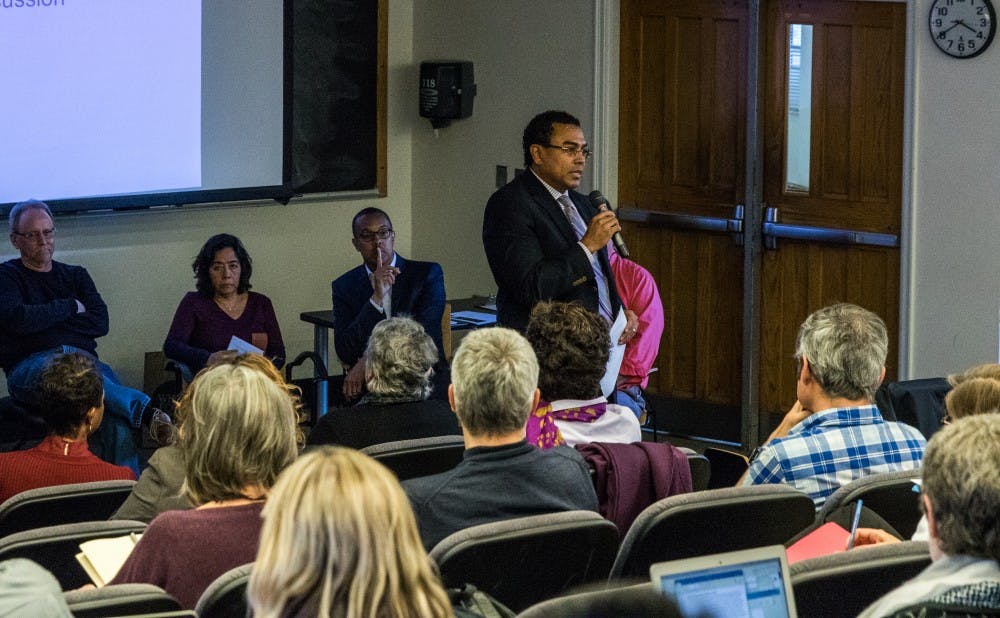At its first meeting of the Spring semester, Trinity’s Arts and Sciences Council continued its ongoing discussion about the proposed new curriculum and was presented with a resolution to take a strong position against two of Trump’s executive orders.
An updated draft of the curriculum was sent to faculty last week that features a number of changes from the earlier version released during the Fall semester, including the re-structuring of the first-year experience and the transformation of the "Signature Core" into "Foundations," which will include courses in writing, a second language and quantitative inquiry.
“I was here during Curriculum 2000. We know things like this do not happen often historically,” said Arlie Petters, dean of academic affairs and associate vice provost for undergraduate education. “So we are living in a special time.”
Lee Baker, professor of cultural anthropology, sociology and African and African American Studies, noted that the philosophical purpose of the curriculum’s core design is a shift away from the distribution requirements model that currently guides students through Duke.
The proposed curriculum changes seek to create a model that allows students to “make meaning” out of their time at the University and integrate their experiences into “something that is amazing,” Baker said.
As it is currently proposed, the curriculum departs from its Fall 2016 version on the first-year experience. The committee pivoted from calling the structure for first-years “Duke Experience” to now labeling it as “Frameworks.” Before the end of their first year on campus, students would have to take three “thematically organized courses”—one in the social sciences, one in the natural sciences and one in the humanities. Participation in the FOCUS program could be a substitute for Frameworks.
The other key shift is from a Signature Core to a Foundation, which students will need to complete by the end of their second year. A Foundation consists of one course that corresponds with current Writing 101 objectives, one course in a second language and one course that fulfills quantitative inquiry objectives. The shift to mandate a class in a second language is a notable departure from the position outlined in the last draft, in which students were required to fulfill one “Languages and Culture” requirement without necessarily taking a class taught in a language other than English.
Joshua Sosin, associate professor of classical studies, expressed concern about whether the newly-termed Foundation will fulfill the University's charge to adequately provide a holistic intellectual basis for students. He raised issue with the idea that forcing students to take a single course in an area would be sufficient to encourage further exploration—comparing it to inviting his son to try cauliflower multiple times in the hope that he will like it someday.
“I think you’re pointing to a fundamental divide among the faculty about to what extent we should be making students try certain kinds of things—and what are those certain kinds of things,” said Suzanne Shanahan, associate research professor of sociology and chair of the Imagining Duke Curriculum committee. “I think it’s not clear across the faculty what those things are, nor is the principle.”
The requirement for a secondary depth of study was renamed as “Focused Inquiries.” A few contentious aspects were noted—including the elimination of pre-matriculation credits and the reduction of the credit/no credit option outlined in previous drafts.
Currently, the committee recommends counteracting the removal of pre-matriculation credits by lowering the number of courses needed to graduate to 32, instead of 34. In departure from earlier drafts, the new one recommends only letting students declare four credit/no credit courses, instead of six.
Mine Çetinkaya-Rundel, associate professor of the practice in statistical science, expressed concern about the possibility of the credit/no credit model enabling grade inflation. Shanahan noted that the issue would be addressed in the implementation phase, which is being handled separately from the curriculum as a directional document, and that the goal of the model is to encourage “intellectual adventurism” among students.
The committee tabled discussion of absentee voting procedures in favor of extended debate on the curriculum, but it did hear the presentation of a resolution to address Trump’s executive orders on building a border wall between Mexico and the travel ban on seven countries.
"I introduced the resolution because I thought it important that colleagues in the faculty governance body of Trinity College of Arts and Sciences take a position against these executive orders and in defense of all members of the Duke community,” said Frances Hasso, associate professor in gender, sexuality and feminist studies.
Hasso said that she hopes to have an electronic vote on the resolution within a week.
The committee plans to vote on the new curriculum in their next meeting, which is scheduled for March 9, Shanahan noted.
Get The Chronicle straight to your inbox
Signup for our weekly newsletter. Cancel at any time.
Bre is a senior political science major from South Carolina, and she is the current video editor, special projects editor and recruitment chair for The Chronicle. She is also an associate photography editor and an investigations editor. Previously, she was the editor-in-chief and local and national news department head.
Twitter: @brebradham
Email: breanna.bradham@duke.edu

